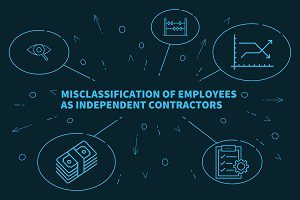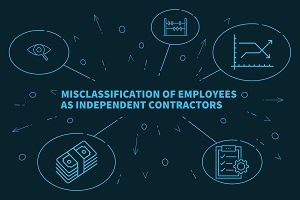The California Supreme Court attacked the so-called “gig economy” in a recent case. Under a new standard adopted by the court, the practice of hiring independent contractors to do work that is integral to a company may be doomed. The court held that workers who perform work that is within a company’s ordinary business operations are employees no matter where they work or how they are labeled. Any business hiring independent contractors should understand this new standard.
Old Standard
Previously, a number of factors were used to determine if a worker was an employee or independent contractor. These included the control and supervision of the business over the  worker’s work, who provided the means to perform the work, how much of the total income for the worker is paid by the business, and if the parties believe the worker is an independent contractor. The emphasis was on control of the worker by the company.
worker’s work, who provided the means to perform the work, how much of the total income for the worker is paid by the business, and if the parties believe the worker is an independent contractor. The emphasis was on control of the worker by the company.
Dynamex Case
On April 30, 2018, the California Supreme Court decided the case of Dynamex Operations West, Inc. v. Superior Court. The case involved delivery drivers hired by Dynamex Operations West, Inc. In 2004, Dynamex converted its drivers from employees to independent contractors. The drivers performed the same job duties but had to provide their vehicles, pay all expenses, maintain their own insurance, and pay all of their own taxes. Drivers were forced to buy a particular smartphone so Dynamex could track their location. Drivers had to buy and wear uniforms, and vehicle signage. Dynamex controlled what packages each driver delivered. Drivers set their own work schedules but had to let Dynamex know in advance when they would work. Drivers were not permitted to sub-contract with a competing delivery service. A driver filed a class action alleging various Labor Code violations on behalf of himself and other similarly situated drivers.
Using older standards, the trial court held that the drivers were independent contractors. The Court of Appeals reversed and the California Supreme Court upheld the Court of Appeals.
ABC Test
The Supreme Court held that the proper test is the “ABC Test” per the wage orders of the California Industrial Welfare Commission. The ABC Test starts with a rebuttable presumption, that all workers are employees unless each of the “ABC” elements are satisfied. The “ABC” elements are:
A. Is the worker free from the control and direction of the company in the performance of the work, both under the contract for the performance of the work and in fact?”
B. Does the worker perform work that is outside the usual course of the company’s business?”
C. Is the worker customarily engaged in an independently established trade, occupation, or business of the same nature as the work performed for the company?
The answer must be Yes to all of the above in order for a worker to be classified as an independent contractor. Clearly, the drivers in Dynamex wouldn’t be independent contractors under the ABC Test.
The court emphasized the “B” and “C” factors of the ABC test for workers doing work in the normal course of a company’s business. The court gave the following example:
“… when a retail store hires an outside plumber to repair a leak in a bathroom … or hires an outside electrician to install a new electrical line, the services … are not part of the store’s usual course of business and the store would not reasonably be seen as having … the plumber or electrician … as an employee. On the other hand, when a clothing manufacturing company hires work-at-home seamstresses to make dresses from cloth and patterns supplied by the company that will thereafter be sold by the company or when a bakery hires cake decorators to work on a regular basis on its custom-designed cakes, the workers are part of … usual business operations and … can reasonably be viewed as … employees.”
The Impact
Businesses must be more careful about the classification of workers, particularly since they are all now presumed to be employees until proven otherwise under the ABC Test. The court came down on the practice of hiring workers as independent contractors who work at home or come into a business irregularly but who do work that is integral to the business. For instance, computer software companies routinely hire coders and technical writers, who work from home as independent contractors, even though those workers provide services that are within the usual course of a software company’s business. Under this test, Uber and Lyft would be hard pressed to contend that their drivers are not employees. The number of claims for wages and benefits will almost certainly increase in light of the Dynamex ruling.
What to Do
Businesses should review their current workers’ status and their contracts with independent contractors. Whenever possible, a contract to outsource work should be with a corporation or limited liability company that is owned by the independent contractor or through an agency. Some workers may need to be hired as employees. However, the process of converting independent contractors to employees comes with another set of risks to consider. If you’re a business owner with any questions about independent contractors, feel free to contact our office to evaluate your situation.
Eric D. Morton is the principal attorney with Clear Sky Law Group. He can be reached at (760) 722-6582, (510) 556-0367, or emorton@clearskylaw.com.



